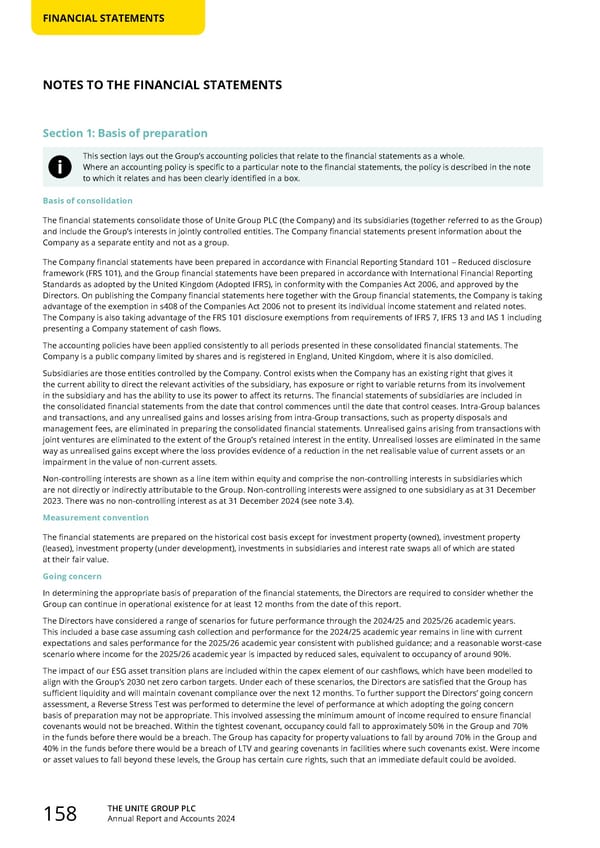THE UNITE GROUP PLC Annual Report and Accounts 2024 158 FINANCIAL STATEMENTS Section 1: Basis of preparation This section lays out the Group’s accounting policies that relate to the financial statements as a whole. Where an accounting policy is specific to a particular note to the financial statements, the policy is described in the note to which it relates and has been clearly identified in a box. Basis of consolidation The financial statements consolidate those of Unite Group PLC (the Company) and its subsidiaries (together referred to as the Group) and include the Group’s interests in jointly controlled entities. The Company financial statements present information about the Company as a separate entity and not as a group. The Company financial statements have been prepared in accordance with Financial Reporting Standard 101 – Reduced disclosure framework (FRS 101), and the Group financial statements have been prepared in accordance with International Financial Reporting Standards as adopted by the United Kingdom (Adopted IFRS), in conformity with the Companies Act 2006, and approved by the Directors. On publishing the Company financial statements here together with the Group financial statements, the Company is taking advantage of the exemption in s408 of the Companies Act 2006 not to present its individual income statement and related notes. The Company is also taking advantage of the FRS 101 disclosure exemptions from requirements of IFRS 7, IFRS 13 and IAS 1 including presenting a Company statement of cash flows. The accounting policies have been applied consistently to all periods presented in these consolidated financial statements. The Company is a public company limited by shares and is registered in England, United Kingdom, where it is also domiciled. Subsidiaries are those entities controlled by the Company. Control exists when the Company has an existing right that gives it the current ability to direct the relevant activities of the subsidiary, has exposure or right to variable returns from its involvement in the subsidiary and has the ability to use its power to affect its returns. The financial statements of subsidiaries are included in the consolidated financial statements from the date that control commences until the date that control ceases. Intra-Group balances and transactions, and any unrealised gains and losses arising from intra-Group transactions, such as property disposals and management fees, are eliminated in preparing the consolidated financial statements. Unrealised gains arising from transactions with joint ventures are eliminated to the extent of the Group’s retained interest in the entity. Unrealised losses are eliminated in the same way as unrealised gains except where the loss provides evidence of a reduction in the net realisable value of current assets or an impairment in the value of non-current assets. Non-controlling interests are shown as a line item within equity and comprise the non-controlling interests in subsidiaries which are not directly or indirectly attributable to the Group. Non-controlling interests were assigned to one subsidiary as at 31 December 2023. There was no non-controlling interest as at 31 December 2024 (see note 3.4). Measurement convention The financial statements are prepared on the historical cost basis except for investment property (owned), investment property (leased), investment property (under development), investments in subsidiaries and interest rate swaps all of which are stated at their fair value. Going concern In determining the appropriate basis of preparation of the financial statements, the Directors are required to consider whether the Group can continue in operational existence for at least 12 months from the date of this report. The Directors have considered a range of scenarios for future performance through the 2024/25 and 2025/26 academic years. This included a base case assuming cash collection and performance for the 2024/25 academic year remains in line with current expectations and sales performance for the 2025/26 academic year consistent with published guidance; and a reasonable worst-case scenario where income for the 2025/26 academic year is impacted by reduced sales, equivalent to occupancy of around 90%. The impact of our ESG asset transition plans are included within the capex element of our cashflows, which have been modelled to align with the Group’s 2030 net zero carbon targets. Under each of these scenarios, the Directors are satisfied that the Group has sufficient liquidity and will maintain covenant compliance over the next 12 months. To further support the Directors’ going concern assessment, a Reverse Stress Test was performed to determine the level of performance at which adopting the going concern basis of preparation may not be appropriate. This involved assessing the minimum amount of income required to ensure financial covenants would not be breached. Within the tightest covenant, occupancy could fall to approximately 50% in the Group and 70% in the funds before there would be a breach. The Group has capacity for property valuations to fall by around 70% in the Group and 40% in the funds before there would be a breach of LTV and gearing covenants in facilities where such covenants exist. Were income or asset values to fall beyond these levels, the Group has certain cure rights, such that an immediate default could be avoided. NOTES TO THE FINANCIAL STATEMENTS
 Home for Success: Unite Students Annual Report 2024 Page 159 Page 161
Home for Success: Unite Students Annual Report 2024 Page 159 Page 161